Lithium
Lithium dosages: 300 mg, 150 mg
Lithium packs: 90 pills, 180 pills, 270 pills, 360 pills
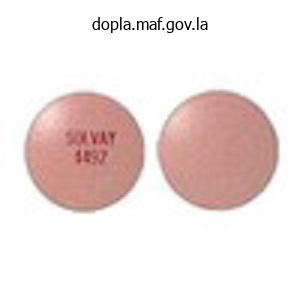
Purchase 300 mg lithium with mastercard
Moreover medicine natural buy lithium mastercard, infiltration of mononuclear cells results in release of proteases which causes plaque disruption [89]. Deregulated oxidant production has the potential to promote the elaboration and activation of matrix degrading enzymes in the fibrous cap of the plaque. Another mechanism that can deter mine the thinning of the fibrous cap is the apoptosis of smooth muscle cells. A very important role, not yet well studied, is that of dendritic cells, namely cells specialized in antigen presentation with a key role in the induction of primary immune response and in the regulation of Tlymphocyte differentiation, as well as in mechanisms of central and peripheral tolerance aiming at the elimination of T lympho cytes that are potentially selfreactive toward selfantigens [92,93]. A characteristic of dendritic cells is also the ability to polarize Tcell responses toward a Thelper phenotype (Th1) in response to bacte rial antigens. Diseaseassociated expansions of these cells have been reported in inflammatory disorders such as rheumatoid arthritis. Clonality and longevity of these cells are associated with defects in apoptotic pathways [99]. The excessive expansion of a pool of senescent T lym phocytes might compromise the efficacy of the immune responses direct against exogenous antigens as well as determinate auto immune responses. Th1 cells and T regulatory 1 cells have been demonstrated to play opposite roles in rupture of atherosclerotic lesion. In all likelihood, a combination of genetic (representing heredity) and serum markers (representing the net interaction between heredity and environment) will ultimately be the ones that should be utilized in primary prevention. Finally, different noninvasive and invasive imaging techniques may be coupled with biomarkers detection to increase the specificity, sen sitivity, and overall predictive value of each potential diagnostic technique. Data available since 2002 strongly reinforce these recommendations and suggest Serum markers correlated to plaque inflammation In recent years, a number of studies have correlated different serologic biomarkers with cardiovascular disease [4,103] leading to a rapid increase in the number of biomarkers available (Table 1. These biomarkers are useful in that they can identify a population at risk of an acute ischemic event and detect the presence of so called vulnerable plaques and/or vulnerable patients [104,105]. Ideally, a biomarker must have certain characteristics to be a potential predictor of incident or prevalent vascular disease. Measurements have to be reproducible in multiple independent samples, the method for determination should be standardized, variability con trolled, and the sensitivity and specificity should be good. In addition, the biomarker should be independent from other estab lished risk markers, substantively improve the prediction of risk with established risk factors, be associated with cardiovascular events in multiple population cohorts and clinical trials, and the cost of the assays has to be acceptable. Finally, to be clinically useful a biomarker should correctly reflect the underlying biological pro cess associated with plaque burden and progression. Therefore, in light of changing atherosclerotic models, vulnerable blood may be better described as blood that has an increased level of activity of plasma determinants of plaque progression and rupture. In this context, proposed biomarkers fall into nine general categories: inflammatory markers, markers for oxidative stress, markers of plaque erosion and thrombosis, lipidassociated markers, markers of endothelial dysfunction, metabolic markers, markers of neovascularization, and genetic markers. The last six biomarker cate gories are not treated in this chapter but only listed in Table 1.
Lithium 300 mg visa
However treatment 4 syphilis purchase lithium 150 mg with amex, immediately after its infusion, most multiple sclerosis patients suffered a frightening, although fortunately brief, flare-up of their illness, illustrating another potential complication of antibody therapy. Alemtuzumab was acting as intended, killing cells by complement- and Fc-dependent mechanisms. Nevertheless, alemtuzumab may be useful at early stages of the disease, when the inflammatory response is maximal, but this has yet to be determined. In controlled studies, the antibodies showed only small therapeutic effects but caused depletion of T lymphocytes from peripheral blood for more than 6 years after treatment. This cautionary tale shows that it is possible to deplete large numbers of lymphocytes and yet completely fail to kill the cells that matter. This second category of treatment is called immunomodulatory therapy, and is illustrated by the use of conventional anti-inflammatory agents such as aspirin, nonsteroidal anti-inflammatory drugs, or low-dose corticosteroids. These are extremely potent anti-inflammatory agents, and the number of diseases in which they have been shown to be effective is growing as further clinical trials are performed. The antibody therapy was associated with a reduction in both subjective and objective parameters of disease activity (as measured by pain score and swollen-joint count, respectively) and in the systemic inflammatory acute-phase response, measured as a fall in the concentration of the acute-phase C-reactive protein. A similar problem with multifocal leukoencephalopathy led to the withdrawal from the market in the United States and Europe in 2009 of another Treatment of unwanted immune responses. Blocking co-stimulatory pathways, as noted above in connection with the prevention of transplantation rejection (see Section 16-6), has also been applied to autoimmune diseases. This drug is approved for the treatment of rheumatoid arthritis, and also seems to be beneficial in treating psoriasis. Although memory T cells are targeted by this therapy, responses to vaccination such as antitetanus remain intact. These effects may be due to an alteration in the cholesterol content of membranes, thereby influencing lymphocyte signaling. The hormone vitamin D3, essential for bone and mineral homeostasis, also exerts immunomodulatory effects. This facilitates the migration of these cells into the plaques of inflammation in multiple sclerosis. The future of this treatment is unclear because of the development of a rare infection as a side-effect (see the text). The major drawback of vitamin D3 is that its immunomodulatory effects are seen only at dosages that would lead to hypercalcemia and bone resorption in humans. There is a major search under way for structural analogs of vitamin D3 that retain the immunomodulatory effects but do not cause hypercalcemia. In some diseases, the target antigen of an unwanted immune response can be identified. It can then be possible to use the antigen itself, rather than drugs or antibodies, to treat the disease, because the manner of antigen presentation can alter the immune response and reduce or eliminate its pathogenic features. As discussed in Section 14-13, this principle has been applied with some success to the treatment of allergies caused by an IgE response to very low doses of antigen.
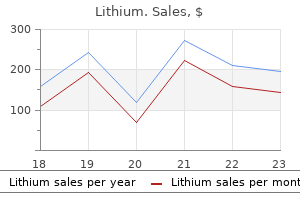
Purchase lithium 300 mg without prescription
The significance of viral augmentation of the asthmatic response is evident from the fact that rhinovirus infection is one of the main causes of hospitalizations for asthma and is associated with the majority of deaths from asthma medicine quinidine buy discount lithium on-line. Adverse reactions to particular foods are common, but only some are due to an immune reaction. Idiosyncrasies are abnormal responses to particular foods whose cause is unknown but which can provoke symptoms resembling those of an allergic response. About 25% of food allergy in children is due to peanuts, and peanut allergy is increasing in incidence. IgE-mediated food allergy can manifest itself in a variety of ways, ranging from a swelling of the lips and oral tissue on contact with the allergen, to gastrointestinal cramping, diarrhea, or vomiting. Local gastrointestinal symptoms are due to activation of mucosal mast cells, leading to transepithelial fluid loss and smooth muscle contractions. Food allergens that subsequently reach the bloodstream can lead to urticaria, asthma, and, in the most severe cases, systemic anaphylaxis that can lead to cardiovascular collapse (see Section 14-10). Certain foods, most importantly peanuts, tree nuts, and shellfish, are particularly associated with severe anaphylaxis. Around 150 deaths occur each year in the United States as a result of a severe allergic reaction to food, with peanut and tree nut allergies accounting for most of the deaths. Peanut allergy is a significant public health problem, especially in schools, where children may be unwittingly exposed to peanuts, which are present in many foods. In one study, infants with severe eczema who were at high risk for developing peanut allergy were randomly assigned either to be fed peanuts regularly, starting between ages 4 and 11 months, or to be on a peanut-avoidance diet for 5 years. This suggests that deliberate introduction into the diet of allergen at the appropriate time to at-risk individuals may suppress the development of food allergy. Of interest is that one of the characteristic features of food allergens is a high degree of resistance to digestion by pepsin in the stomach. This allows them to reach the mucosal surface of the small intestine as intact allergens. Cases of IgE-mediated food allergies arising in small numbers of previously unaffected adults who were taking antacids or proton-pump inhibitors for ulcers or acid reflux have been proposed to be due to impaired digestion of potential allergens in the less acidic stomach conditions produced by these medications. Treatment is largely palliative, rather than curative, and the drugs often need to be taken throughout life. Examples of treatments in current clinical use for allergic reactions are listed in the top half of the table, with approaches under investigation listed below. Antihistamines that target the H1 receptor reduce the symptoms that follow the release of histamine from mast cells in allergic rhinoconjunctivitis and IgE-triggered urticaria. In urticaria, for example, the relevant H1 receptors include those on blood vessels and unmyelinated nerve fibers in the skin. Anticholinergic drugs bronchodilate constricted airways and reduce respiratory secretions. Antileukotriene drugs act as antagonists of leukotriene receptors on smooth muscle, endothelial cells, and mucous-gland cells, and are also used to relieve the symptoms of allergic rhinoconjunctivitis and asthma.
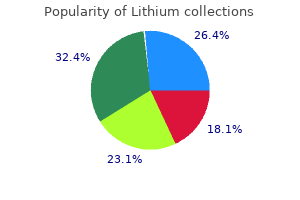
300 mg lithium with visa
Balloon pulmonary valvuloplasty has also been effectively uti lized in adult patients medicine hat weather cheap 150 mg lithium overnight delivery. Balloon diameter selection is more challeng ing in adults, as there are significantly fewer data available. Best available data suggest that balloon diameter approximately 1 mm larger than the annulus is effective [22,23]. In larger patients, achieving a balloon diameter of this size with conventional balloons has often necessitated the use of double and triple balloon tech niques. However, the introduction of Inoue balloons has provided an effective alternative, permitting single balloon dilatation [23]. Complications Pulmonary artery tears, rupture of tricuspid valve papillary muscles, and right ventricular outflow tract rupture have all been docu mented; however, all have decreased significantly in frequency with continued experience and improvement in device technology. Therefore, not unexpectedly, the incidence of infundibular obstruction following the procedure remains high, occurring in approximately 30% of cases [24]. Outcomes Large studies of pulmonary valvuloplasty have routinely demon strated effective relief of pulmonary stenosis. A study of 533 patients found that of those with normal valve morphology, 85% maintained a gradient <36 mmHg and were free from reintervention during a median followup of 33 months. Results were less impressive for patients found to have dysplastic valve morphology, with only 65% demonstrating a similar outcome [25]. These findings have been consistent across studies and have been notably less successful in patients with Noonan syndrome who classically exhibit thickened, dysplastic valve leaflets. However, given the relative low rate of severe complications compared with surgical repair, valvuloplasty is still typically attempted [26]. This study excluded individuals with other forms of congenital heart disease, those with residual valvar stenosis, and those requiring interim valve replace ments. However, it suggests that while valvar insufficiency follow ing balloon dilatation is prevalent and more likely when larger balloon to annulus ratios are used, the frequency of severe regurgi tation may not be as high as previously assumed [28]. A review of the Society of Thoracic Surgeons Database revealed that both are associated with relatively high mortality rates, 6. At this time there are no consensus guidelines that establish criteria for intervention. Predilatation of the pulmonary valve with balloon valvuloplasty can be performed to improve ease of access across the valve. The use of a guidewire with markers is helpful given the likelihood of foreshortening in standard angiographic projections leading to potential underestimation of the length of obstruction. Peripheral vascular stents provide the benefit of potential for progressive dilatation as the child grows, whereas the maximal diameter of coronary stents is inherently limited. Ideally, the stent is not placed across the pulmonary valve so as to avoid or minimize pulmonary regurgitation. Placement of a stent across the pulmonic valve produces the same physiology as a nonvalved right ventricle to pulmonary artery conduit, which is generally well tolerated prior to definitive surgical repair.
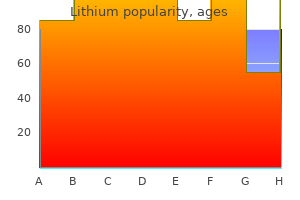
Diseases
- Hand Sch?ller Christian disease
- Chromosome 20 Chromosome 22
- Hereditary spastic paraplegia
- Hypothalamic dysfunction
- Parsonage-Turner syndrome
- Isaacs syndrome

Order lithium 300 mg without prescription
Alternatively symptoms 5dpiui order genuine lithium, the autoantibody-sensitized red blood cells can be lysed by formation of the membrane-attack complex of complement. Lysis of nucleated cells by complement is less common because these cells are better defended by complement-regulatory proteins, which protect cells against immune attack by interfering with the activation of complement components (see Section 2-15). Autoantibodies against neutrophils, for example, cause neutropenia, which increases susceptibility to infection with pyogenic bacteria. In all these cases, accelerated clearance of autoantibody-sensitized cells is the cause of their depletion. One therapeutic approach to this type of autoimmunity is removal of the spleen, the organ in which the main clearance of red cells, platelets, and leukocytes occurs. The binding of IgG and IgM antibodies to cells in tissues causes inflammatory injury by a variety of mechanisms. Although nucleated cells are relatively resistant to lysis by complement, the assembly of sublytic amounts of the membrane-attack complex on their surface provides a powerful activating stimulus. Depending on the cell type, this interaction can cause cytokine release, a respiratory burst, or the mobilization of membrane phospholipids to generate arachidonic acid-the precursor of prostaglandins and leukotrienes, lipid mediators of inflammation. Most cells in tissues are fixed in place, and innate and adaptive immune cells are attracted to them by chemoattractant molecules. One such molecule is the complement fragment C5a, which is released as a result of complement activation triggered by autoantibody binding. Other chemoattractants, such as leukotriene B4, can be released by the autoantibody-targeted cells. Inflammatory leukocytes are further activated by binding to autoantibody Fc regions and fixed complement C3 fragments on cells. Direct T-cell-mediated cytotoxicity, which we discuss later, is probably also important in this disease. In autoimmune hemolytic anemias, red blood cells (erythrocytes) coated with IgG autoantibodies against a cell surface antigen (upper panel) are rapidly cleared from the circulation by uptake by Fc receptorbearing macrophages located primarily in the spleen (lower left panel). The binding of certain rare autoantibodies that fix complement extremely efficiently causes the formation of the membraneattack complex on the red cells, leading to intravascular hemolysis (lower right panel). Antibody binding to a receptor can either stimulate the receptor or block stimulation by the natural ligand. In myasthenia gravis, autoantibodies against the chain of the nicotinic acetylcholine receptor present at neuromuscular junctions in skeletal muscle cells can block stimulation of muscle contraction. In normal circumstances, acetylcholine released from stimulated motor neurons at the neuromuscular junction binds to acetylcholine receptors on skeletal muscle cells, triggering muscle contraction (upper panel). Myasthenia gravis is caused by autoantibodies against the subunit of the receptor for acetylcholine.
Purchase 150 mg lithium free shipping
The operator should explicitly report the medical necessity for the documented radiation level in the procedure report using enough detail to be understandable for case review purposes symptoms vitamin b12 deficiency discount lithium 300 mg overnight delivery. These events, as with all essential aspects of laboratory radiation safety, should be a regular component of the catheterization laboratory quality improvement program. Though the benefits are quantifiable with decreased morbidity and mortality, the risks of radiation are less clear. In interventional cardiology, the importance of a radiationconscious environment is stressed where protection for the patient protects the staff and vice versa. Methods for measuring patient dose, monitoring staff dose, implementing appropriate training, and managing radiation dose from the outset of the procedure are important components of a catheterization laboratory radiation safety program. Personal dose monitoring Staff radiation levels are known [4,14] and generally well below regulatory dose limits provided that best practices are followed. Shielding Protective garments must be worn by all persons who are in the procedure room when the Xray beam is on. These garments are designed to protect the gonads and 80% of the active bone marrow. Separate thyroid shielding (also approximately 90% reduction) is recommended for younger workers as well as all individuals whose externally worn dosimeter at collar level exceeds 4 mSv in a month [16]. Patientcentric: predischarge this should always be done as a personal communication. Do not scratch or scrub the area where we worked For the next year, please tell all of your healthcare providers that you had a procedure that used radiation and may have caused a skin reaction In a month, have a family member examine your back for a red area about the size of a hand. If anything is seen please contact the catheterization laboratory for further instructions. The discussion should be with a physician or radiation trained midlevel provider If the individual taking the call cannot absolutely rule out a radiation etiology, the patient should be scheduled for an examination by the physician performing the procedure. Proper protective garment care, including hanging aprons on designated racks with adequate hangers and periodic inspection for damage, is an essential part of radiation safety. Welldesigned eye shielding reduces dose to the lens of the eye by approximately twothirds. Protective hand equipment is often labeled with warnings against placing the hands in or near the beam. Inlaboratory moveable barriers provide protection for staff required to be in the procedure room, while individuals not required in the fluoroscopic suite should remain in the control room. Disposable radiationabsorbing nonlead patient sterile drapes also help to reduce staff dose but do not always provide a substantial benefit [26].
Generic lithium 150 mg mastercard
When deploying the stent medicine 2632 cheap lithium 300 mg online, release at least 5 mm of the stent distally and wait for it to expand and stabilize against the wall before releasing the remainder of the stent. It is prudent to be aware that tortuous segments are not straightened by a stent but are sim ply displaced cephalad and can be exaggerated. Postdilatation Postdilatation is always a critical step as the greatest amounts of emboli are released in this phase. General access site management should apply and take into account that an early ambulation and discharge can counteract the activated carotid sinus reflex and the occasionally observed postprocedural hypotension. Predilatation Predilatation is reserved for very tight lesions, heavily calcified lesions, or stenoses with a high tendency to recoil such as long fibrotic lesions. This is usually undertaken with a low profile coro nary balloon in the range of 2. Consideration should be given to using a cutting balloon for heavily calcified lesions, usually with a diameter of 3. Our group reported on the use of this application in 111 patients with severe highly calcific de novo disease with a procedural technical success rate of 100% [59,60]. Large doses of atropine are avoided in the elderly, as this can result in confusion and make accurate neurologic assessment difficult. In addition, availability in a tapered shape would be suitable for the vessel size mismatch. Carotid stenting complications Bradycardia and hypotension Transient sinus bradycardia or asystole are relatively common responses during balloon dilatation at the carotid bifurcation and pretreatment with atropine is preventative. The concept to cover from angiographically normaltonormal segments is illustrated. Hypotension from stimulation of the baroreceptors from both balloon dilatation and the persisting stretch of the selfexpanding stent is not uncommon and is usually managed by adequate intravascular volume expansion, but with heavily calcified lesions can be more pronounced and require small doses of intravenous vasopressors such as 0. Severe sustained hypotension can require dopamine infusion, but it is important not to overlook other potential causes of hypotension such as retroperitoneal hemorrhage. If a significant change appears and persists, gen eral patient care should be instituted with emphasis on maintaining normal blood pressure and intravascular volume status, stabilizing heart rate, and maintaining a viable airway with oxygen administra tion. If the patient becomes agitated and especially if the airway is compromised, the assistance of an anesthesiologist should be uti lized. Whenever possible the procedure should be concluded quickly and intracranial angiography undertaken. Large vessel occlusion is easy to detect, but embolism in the smaller branches requires careful scrutiny utilizing the preproc edural angiogram. For a symptomatic small branch occlusion, adequate hydration, blood pressure, and anticoagulation should be ensured.
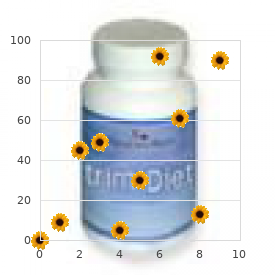
300 mg lithium
Coronary angiography has numerous limitations medicine youth lyrics purchase 300 mg lithium with mastercard, including foreshortening and vessel overlap, high inter and intraobserver variability when assessing lesion severity, and provides no details of plaque burden or composition. The equipment required to perform intracoronary ultrasound consists of a catheter incorporating a miniaturized transducer and a console to reconstruct the images. After reflection from tissue, part of the ultra sound energy returns to the transducer; the transducer then gener ates an electrical impulse that is converted into moving pictures [12]. Sound waves bounce back at various intervals depending on the type of material and the distance from the transducer. It is the variation in reflective sound waves that creates the ultrasound image on the console. The intensity of reflected (or backscattered) ultrasound depends on a number of variables including the intensity of the transmitted signal, the attenuation of the signal by the tissue, the distance from the transducer to the target, the angle of the signal relative to the target, and the density of the tissue [5]. Several clinically relevant properties of the ultrasound image-such as the resolution, depth of penetration, and attenuation of the acoustic-are dependent on the geometric and frequency properties of the transducer. The higher the center frequency, the better the axial resolution, but the lower the depth of penetration. The use of high ultra sound frequencies provides axial resolution between 80 and 120 m and lateral resolution (dependent on imaging depth and beam shape) between 200 and 500 m [5]. The highest frequency that the human ear can detect is approx imately 20 thousand cycles per second (20,000 Hz). Mechanical probes use a drive cable to rotate a singleelement transducer at the tip of the catheter at 1800 rpm. The mechanical transducer has the advantage of a simple design, greater signaltonoise ratio, and higher temporal and spatial resolution. In electronic systems, multiple tiny trans ducer elements in an annular array are activated sequentially to generate the crosssectional image [5,12]. Reverberation artifacts are more common from strong echoreflectors such as stents, guidewires, guiding catheters, and calcium (especially after rotational atherectomy). Off axis position of the catheter can alter vessel geometry in an elliptical fashion to mislead the operator to overestimate the lumen and vessel area [15]. Ringdown Ringdown artifacts usually appear as a series of parallel bands or halos of variables thickness surrounding the catheter obscuring near field imaging. For practi cal propose the mean lumen area tends to increase as the degree of distortion increases [14]. A longi tudinal view (Lmode or longview) can be also displayed, but this should be done only when using motorized transducer pullback. There are advantages and disadvantages to using manual or motorized pullback; however, motorized pullback is usually pref erable.
Ivan, 39 years: Clinical outcomes in the percutaneous coronary intervention of instent restenosis with everolimuseluting stents. Lysosomes fail to fuse properly with phagosomes, and killing of ingested bacteria is impaired. Patients who have had previous exposure to thrombin or bovine proteins are at risk of immunologic crossreactivity.
Yussuf, 40 years: Renal denervation for resistant hypertension was offered on an individual patient basis in Europe, Asia, and Australasia. Similarly, as we understand more about tumors and infectious agents, better strategies to mobilize the immune system against cancer and infection are becoming possible. As many of the species cannot be grown in culture, their exact numbers and identities are only now being established by high-throughput sequencing techniques.
Mine-Boss, 28 years: The sutures are then withdrawn using the needles, and a pretied knot is pushed through the skin to the top of the arteriotomy site on the outside of the artery. The Glider balloon is designed with an oblique cut at the distal tip to facilitate crossing into the side branch: once the shorter aspect of the oblique tip has stopped at the difficult to cross side branch ostium, the balloon is rotated and the longer aspect of the balloon is then expected to emerge beyond the ostium allowing opening of the strut with inflation. Nonetheless, recent animal studies have shown that it is not the speed of alcohol injection, but the amount of alcohol injected that determines the resultant infarct size [35,36].
Corwyn, 27 years: Patients infected with one strain of virus do not seem to be resistant to closely related strains, and cases of superinfection, where two strains simultaneously infect the same cell, have also been described. Results and longterm predictors of adverse clinical events after elective percutaneous interventions on unprotected left main coronary artery. Adenosinemediated effects of ticagrelor: evi dence and potential clinical relevance.
Torn, 54 years: Graft-Versus-Host Disease Specific antibodies directed against T cells have been used to treat episodes of graft rejection that occur after transplantation. Transcatheter closure of patent foramen ovale: a definitive treatment for playpneaorthodeoxia. Now these patients require further intervention to address the right ventricular over load, ventricular dysfunction, and ventricular arrhythmias caused by their pulmonary regurgitation.
Hogar, 59 years: Balloon dilatation of calcific aortic stenosis in elderly patients: postmortem, intraoperative, and percutaneous valvuloplasty studies. Three parenteral agents are currently available for clinical use in these populations: recombined hirudin (lepirudin), argatroban, and bivalirudin [87]. Other than a Inoue balloon, a single balloon technique can be applied for mitral valve dilatation.
Stan, 36 years: A similar problem prevents routine use of animal organs-xenografts-in transplantation. The EkoSonic device is capable of simultaneously infusing a fibrino lytic drug within the pulmonary artery, and of emitting low power, highfrequency (2. Percutaneous balloon versus surgical closed and open mitral commissurotomy: sevenyear followup results of a randomized trial.
Angar, 50 years: Once device position is determined to be stable and there is a significant reduction in shunt (mild residual shunt), the device is released. A comparison of balloonexpandable stent implantation with balloon angioplasty in patients with coronary artery disease. Because commensal microbes are noninvasive, dendritic cells are not fully activated and induce a finely balanced response, comprising secretory IgA antibodies that enter intestinal secretions and are directed at commensal bacteria.
Hurit, 49 years: When administering vasodilators, it is appropriate to observe the change in the Pd/Pa ratio as it may fluctuate before settling during a period of stable hyperemia [16]. Such adoptive transfer studies are a cornerstone in the study of the intact immune system. Despite their efficacy and resulting enthusiastic use, however, concerns rapidly surfaced over their longterm safety.
Hamil, 61 years: An inadequate puncture site will lead to the following complica tions: aortic hugging if the puncture is too anterior, for example through a patent foraman ovale; inability to cross the mitral valve in a too high puncture; inability to pull back the clip and tether the leaflets after a too low puncture; and, finally, risk of perforation if the puncture is too posterior. The tip should be shaped under steam or hot air, according to the anatomy of that particular aneurysm and the parent artery. Outcome impact of coronary revasculari zation strategy reclassification with fractional flow reserve at time of diagnostic angiography: insights from a large French multicenter fractional flow reserve registry.
Rasarus, 34 years: A comparison of lowmolecularweight heparin with unfractionated heparin for unstable coronary artery disease. Aggressive medical therapy with risk factor modification and lipid lowering is essential. Almost half the population of North America and Europe is sensitized to one or more common environmental antigens, and, although rarely life-threatening, allergic diseases initiated by contact with a specific allergen can cause much distress and lost time from school and work.
Gorok, 63 years: If the device is recaptured in the right atrium, the delivery sheath is sufficiently curved to allow cross ing of the atrial septum with the device at the tip of the delivery sheath; however, this should be performed very cautiously as inad vertent cardiac perforation could occur if not at the atrial septum. If the guide catheter is balloon tipped, the balloon should be inflated and continuous suction applied during removal and until the stent retriever exits the proximal end of the catheter (Video 68. Paclitaxel is a natu ral diterpenoid extracted from the bark, roots, and leaves of several Taxus species, including Taxus brevifolia and Taxus media.
Urkrass, 29 years: Usefulness and safety of the GuideLiner catheter to enhance intubation and support of guide catheters: insights from the Twente GuideLiner registry. On the other hand, ruptured aneurysms are prone to rebleed, which is why premedication with platelet inhibitors is contraindicated in the acute phase following the rupture. Studies of human T cells have relied largely on T-cell clones because a suitable fusion partner for making T-cell hybrids has not been identified.
Kippler, 53 years: There are five main antibody classes: IgA, IgD, IgM, IgG, and IgE, containing heavy chains, and, respectively. Guide catheters have thinner walls than diag nostic catheters to increase inner lumen size and can be easily damaged by excessive rotation (Table 5. Such studies have revealed that melanomas carry at least five different antigens that can be recognized by cytotoxic T lymphocytes.
Julio, 58 years: Immune complexes are produced when there is an antibody response to a soluble antigen. Conclusions Atherosclerosis is now recognized as a diffuse and chronic inflam matory disorder involving vascular, metabolic, and immune sys tem with various local and systemic manifestations. Early stent thrombosis or stent thrombosis occurring inhospital has been associated with worse clinical outcome than late/very late stent thrombosis [19,22,23].
Dennis, 22 years: Differentiation of the crimped stent from the underlying balloon can sometimes be difficult despite concerted efforts to tilt and rotate the ultrasound probe, especially in cases with poor acoustic windows or significant acoustic shadowing. Previously, the extent of myocardial necrosis had been shown to be intimately linked to the duration of coronary artery occlusion [13,14]. This phenomenon is very rare, however, compared with the prevalence of nickel sensitivity in the general population (~8%) and we do not routinely test for nickel sensitivity prior to implantation.
Gembak, 42 years: In brief, the energy differential between blood and metallic stent surface contributes not only to protein deposition on the stent, but also influences which proteins are deposited (fibrin, fibronectin, albumin, etc. A clinical trial comparing three antithrom boticdrug regimens after coronaryartery stenting. Managing patient radiation is generally divided into actions that are required before, during, and after a procedure [4,10,11].
Kirk, 43 years: This can have long-lasting effects as a result of the ability of T cells to become memory cells, and there is no requirement for histocompatibility because the transfused cells are derived from the patient. Endothelial cell recovery, acute thrombogenicity, and monocyte adhesion and activation on fluorinated copolymer and phosphorylcholine polymer stent coatings. There is currently no uniform definition of cardiogenic shock in clinical practice or for research purposes.
Narkam, 26 years: Another example is, where autoantibodies against the receptor stimulate excessive production of thyroid hormone. Thrombus identification on angiography is considered routine but operators should remember that angiography has only 26% sen sitivity in predicting the presence of thrombus [5,13]. While most internal tissues are free of active microbial growth, the skin and the various mucosae lining organs that directly contact the external world will have continuous encounters with environmental microbes.
Vandorn, 60 years: Paclitax eleluting versus uncoated stents in primary percutaneous coronary intervention. In this con text, plaques with active inflammation can be identified directly by extensive macrophage accumulation [133]. For four important autoimmune diseases, the figure lists the roles of T cells, B cells, and antibody.
10 of 10 - Review by D. Candela
Votes: 263 votes
Total customer reviews: 263
